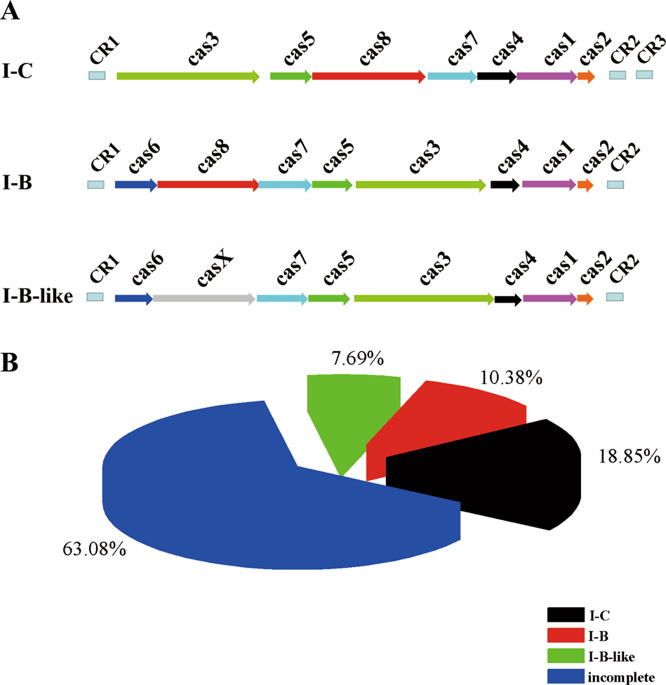Our official English website, www.x-mol.net, welcomes your
feedback! (Note: you will need to create a separate account there.)
The CRISPR-Cas systems were selectively inactivated during evolution of Bacillus cereus group for adaptation to diverse environments.
The ISME Journal ( IF 10.8 ) Pub Date : 2020-03-04 , DOI: 10.1038/s41396-020-0623-5 Ziqiang Zheng 1 , Yulan Zhang 1 , Zhiyu Liu 1 , Zhaoxia Dong 1 , Chuanshuai Xie 1 , Alejandra Bravo 2 , Mario Soberón 2 , Jacques Mahillon 3 , Ming Sun 1 , Donghai Peng 1
The ISME Journal ( IF 10.8 ) Pub Date : 2020-03-04 , DOI: 10.1038/s41396-020-0623-5 Ziqiang Zheng 1 , Yulan Zhang 1 , Zhiyu Liu 1 , Zhaoxia Dong 1 , Chuanshuai Xie 1 , Alejandra Bravo 2 , Mario Soberón 2 , Jacques Mahillon 3 , Ming Sun 1 , Donghai Peng 1
Affiliation

|
CRISPR-Cas systems are considered as barriers to horizontal gene transfer (HGT). However, the influence of such systems on HGT within species is unclear. Also, little is known about the impact of CRISPR-Cas systems on bacterial evolution at the population level. Here, using Bacillus cereus sensu lato as model, we investigate the interplay between CRISPR-Cas systems and HGT at the population scale. We found that only a small fraction of the strains have CRISPR-Cas systems (13.9% of 1871), and most of such systems are defective based on their gene content analysis. Comparative genomic analysis revealed that the CRISPR-Cas systems are barriers to HGT within this group, since strains harboring active systems contain less mobile genetic elements (MGEs), have lower fraction of unique genes and also display limited environmental distributions than strains without active CRISPR-Cas systems. The introduction of a functional CRISPR-Cas system into a strain lacking the system resulted in reduced adaptability to various stresses and decreased pathogenicity of the transformant strain, indicating that B. cereus group strains could benefit from inactivating such systems. Our work provides a large-scale case to support that the CRISPR-Cas systems are barriers to HGT within species, and that in the B. cereus group the inactivation of CRISPR-Cas systems correlated with acquisition of MGEs that could result in better adaptation to diverse environments.
中文翻译:

在蜡样芽胞杆菌群的进化过程中,CRISPR-Cas系统被选择性失活,以适应不同的环境。
CRISPR-Cas 系统被认为是水平基因转移 (HGT) 的障碍。然而,此类系统对物种内 HGT 的影响尚不清楚。此外,人们对 CRISPR-Cas 系统对群体水平细菌进化的影响知之甚少。在这里,我们使用蜡样芽孢杆菌(Bacillus cereus sensu lato)作为模型,在群体规模上研究 CRISPR-Cas 系统和 HGT 之间的相互作用。我们发现,只有一小部分菌株具有 CRISPR-Cas 系统(1871 年的 13.9%),并且根据基因内容分析,大多数此类系统都有缺陷。比较基因组分析表明,CRISPR-Cas系统是该组中HGT的障碍,因为与没有活性CRISPR的菌株相比,含有活性系统的菌株含有较少的可移动遗传元件(MGE),独特基因的比例较低,并且也显示出有限的环境分布。卡斯系统。将功能性CRISPR-Cas系统引入缺乏该系统的菌株中,会导致转化菌株对各种胁迫的适应性降低,并降低其致病性,这表明蜡样芽孢杆菌组菌株可以从灭活此类系统中受益。我们的工作提供了一个大规模的案例来支持 CRISPR-Cas 系统是物种内 HGT 的障碍,并且在蜡状芽孢杆菌组中,CRISPR-Cas 系统的失活与 MGE 的获得相关,这可能导致更好地适应多样化的环境。
更新日期:2020-03-04
中文翻译:

在蜡样芽胞杆菌群的进化过程中,CRISPR-Cas系统被选择性失活,以适应不同的环境。
CRISPR-Cas 系统被认为是水平基因转移 (HGT) 的障碍。然而,此类系统对物种内 HGT 的影响尚不清楚。此外,人们对 CRISPR-Cas 系统对群体水平细菌进化的影响知之甚少。在这里,我们使用蜡样芽孢杆菌(Bacillus cereus sensu lato)作为模型,在群体规模上研究 CRISPR-Cas 系统和 HGT 之间的相互作用。我们发现,只有一小部分菌株具有 CRISPR-Cas 系统(1871 年的 13.9%),并且根据基因内容分析,大多数此类系统都有缺陷。比较基因组分析表明,CRISPR-Cas系统是该组中HGT的障碍,因为与没有活性CRISPR的菌株相比,含有活性系统的菌株含有较少的可移动遗传元件(MGE),独特基因的比例较低,并且也显示出有限的环境分布。卡斯系统。将功能性CRISPR-Cas系统引入缺乏该系统的菌株中,会导致转化菌株对各种胁迫的适应性降低,并降低其致病性,这表明蜡样芽孢杆菌组菌株可以从灭活此类系统中受益。我们的工作提供了一个大规模的案例来支持 CRISPR-Cas 系统是物种内 HGT 的障碍,并且在蜡状芽孢杆菌组中,CRISPR-Cas 系统的失活与 MGE 的获得相关,这可能导致更好地适应多样化的环境。











































 京公网安备 11010802027423号
京公网安备 11010802027423号